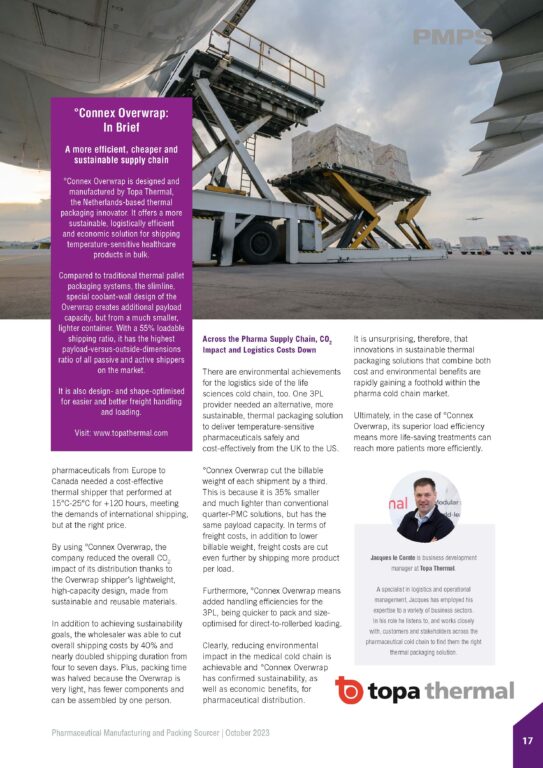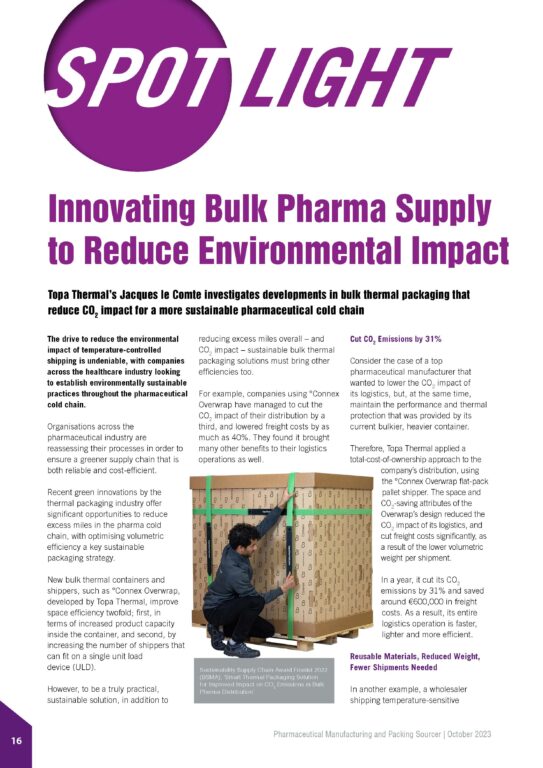Innovating Bulk Pharma Supply to Reduce Environmental Impact
Topa Thermal's Jacques le Comte investigates developments in bulk thermal packaging that reduce CO2 impact for a more sustainable pharmaceutical cold chain.
First published in Pharmaceutical Manufacturing and Packing Sourcer, October 2023

The drive to reduce the environmental impact of temperature-controlled shipping is undeniable, with companies across the healthcare industry looking to establish environmentally sustainable practices throughout the pharmaceutical cold chain.
Organisations across the pharmaceutical industry are re-assessing their processes in order to ensure a greener supply chain that is both reliable and cost-efficient.
Recent green innovations by the thermal packaging industry offer significant opportunities to reduce excess miles in the pharma cold chain, with optimising volumetric efficiency a key sustainable packaging strategy.
New bulk thermal containers and shippers such as Connex Overwrap, developed by Topa Thermal, improve space efficiency twofold; firstly in terms of increased product capacity inside the container, and secondly by increasing the number of shippers that can fit on a single ULD.
However, to be a truly practical, sustainable solution, in addition to reducing excess miles overall – and CO2 impact – sustainable bulk thermal packaging solutions must bring other efficiencies too.
Companies using Connex Overwrap for example have managed to cut the CO2 impact of their distribution by a third, and lowered freight costs by as much as 40%. The found it brought many other benefits to their logistics operations too.
Cut CO2 emissions by 31%
For example, a top pharmaceutical manufacturer wanted to lower the CO2 impact of their logistics, but at the same time maintain the performance and thermal protection that was provided by their current bulkier, heavier container.
We therefore applied a total cost of ownership approach to their distribution, using the °Connex Overwrap flat-pack pallet shipper. The space and CO2-saving attributes of the Overwrap’s design reduced the CO2 impact of their logistics, and cut freight costs significantly due to the lower volumetric weight per shipment.
In a year, they cut their CO2 emissions by 31% and saved around €600,000 in freight costs. As a result their entire logistics operation is also faster, lighter and more efficient.
Reusable materials, reduced weight, fewer shipments needed
In the case of a wholesaler shipping temperature sensitive pharmaceuticals from Europe to Canada, the company needed a cost-effective thermal shipper that performed at 15°C – 25°C for +120 hours, meeting the demands of international shipping, but at the right price.
By using Connex Overwrap, they reduced the overall CO2 impact of their distribution due to the Overwrap shipper’s light-weight, high capacity design, made from sustainable and reusable materials.
In addition to achieving sustainability goals, they were able to cut overall shipping costs by 40% and nearly doubled shipping duration from 4 to 7 days. They also halved packing time because the Overwrap is very light, has fewer components, and can be assembled by one person.
Across the pharma supply chain, CO2 impact and logistics costs down
There are environmental achievements for the logistics side of the lifesciences cold chain too. One 3PL provider needed an alternative, more sustainable, thermal packaging solution to deliver temperature sensitive pharmaceuticals safely and cost-effectively from the UK to the US.
Connex Overwrap cut the billable weight of each shipment by a third. This is because it is 35% smaller and much lighter, than conventional quarter PMC solutions, but has the same payload capacity. In terms of freight costs, in addition to lower billable weight, freight costs are cut even further by shipping more product per load.
Furthermore, Connex Overwrap means added handling efficiencies for the 3PL, being quicker to pack and size-optimised for direct-to-rollerbed loading.
Clearly, reducing environmental impact in the medical cold chain is achievable and Connex Overwrap has confirmed sustainability as well as economic benefits for pharmaceutical distribution.
It is unsurprising, therefore, that innovations in sustainable thermal packaging solutions that combine both cost and environmental benefits are rapidly gaining a foothold within the pharma cold chain market.
Ultimately, in the case of Connex Overwrap, its superior load efficiency means more life-saving treatments can reach more patients more efficiently.


